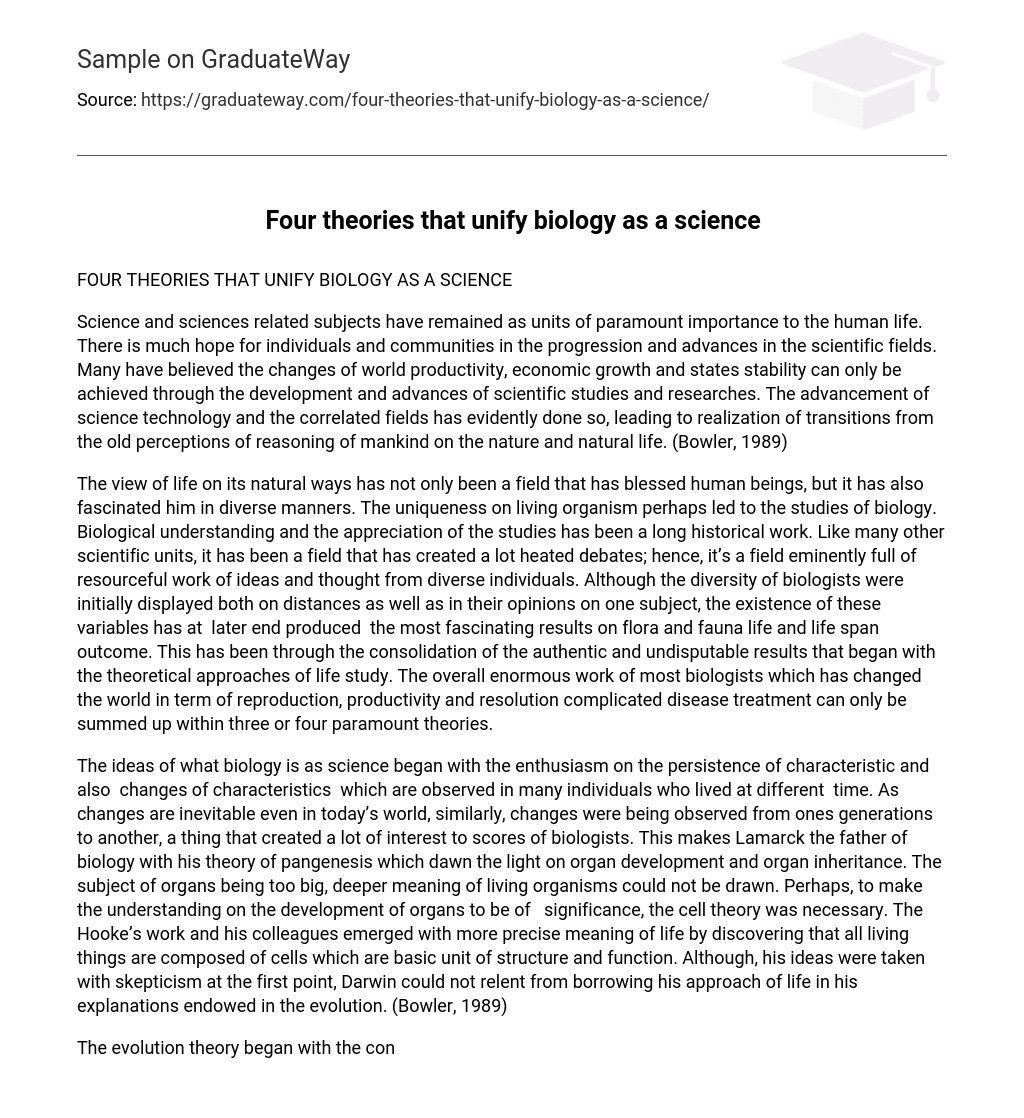Science and sciences related subjects have remained as units of paramount importance to the human life. There is much hope for individuals and communities in the progression and advances in the scientific fields. Many have believed the changes of world productivity, economic growth and states stability can only be achieved through the development and advances of scientific studies and researches. The advancement of science technology and the correlated fields has evidently done so, leading to realization of transitions from the old perceptions of reasoning of mankind on the nature and natural life. (Bowler, 1989)
The view of life on its natural ways has not only been a field that has blessed human beings, but it has also fascinated him in diverse manners. The uniqueness on living organism perhaps led to the studies of biology. Biological understanding and the appreciation of the studies has been a long historical work. Like many other scientific units, it has been a field that has created a lot heated debates; hence, it’s a field eminently full of resourceful work of ideas and thought from diverse individuals. Although the diversity of biologists were initially displayed both on distances as well as in their opinions on one subject, the existence of these variables has at later end produced the most fascinating results on flora and fauna life and life span outcome. This has been through the consolidation of the authentic and undisputable results that began with the theoretical approaches of life study. The overall enormous work of most biologists which has changed the world in term of reproduction, productivity and resolution complicated disease treatment can only be summed up within three or four paramount theories.
The ideas of what biology is as science began with the enthusiasm on the persistence of characteristic and also changes of characteristics which are observed in many individuals who lived at different time. As changes are inevitable even in today’s world, similarly, changes were being observed from ones generations to another, a thing that created a lot of interest to scores of biologists. This makes Lamarck the father of biology with his theory of pangenesis which dawn the light on organ development and organ inheritance. The subject of organs being too big, deeper meaning of living organisms could not be drawn. Perhaps, to make the understanding on the development of organs to be of significance, the cell theory was necessary. The Hooke’s work and his colleagues emerged with more precise meaning of life by discovering that all living things are composed of cells which are basic unit of structure and function. Although, his ideas were taken with skepticism at the first point, Darwin could not relent from borrowing his approach of life in his explanations endowed in the evolution. (Bowler, 1989)
The evolution theory began with the confirmation that variations exists in progeny. He elaborated in his work “the origin of species” by which he saw the variations either enhancing the survival of some individuals while other was diminished. However, the revelation that variations existed within the living organisms was most intriguing matter. But, the cell and the revolution ideas never brought any better understanding of the origins and functions which brought all variation and similarities within species. Nevertheless, the foundations of variations were laid down with the discovery of gamete cells whose research revelations of its contents demonstrated the existence of structure. Mendel’s work on the reproductive cells from the psuim and other organisms such the drosophila were fundamental as they unveiled that cells carries what brought all that fascinated the past man. Having the ability to established that hereditary materials (thus the gene theory of Gregor Mendel) were within the pollen cells, much of other pieces of information of Mendel dwelled on the structures know as chromosomes hence the chromosomal theory. What credibility to Mendel by the molecular scientists of today!
The world of today is now depending on the biology as science to solve sophisticated problems such as food crisis, cancer disease treatments, other human body disorders as well as solving environmental difficulties by the application of the unified studies of these core theories. Biology would not have existed as science with dispensability of any of these theories. (Bowler, 1989)
Reference:
Bowler, P. (1989): The Emergence of Hereditarian Concepts in Modern Science and Society: Johns Hopkins University Press





